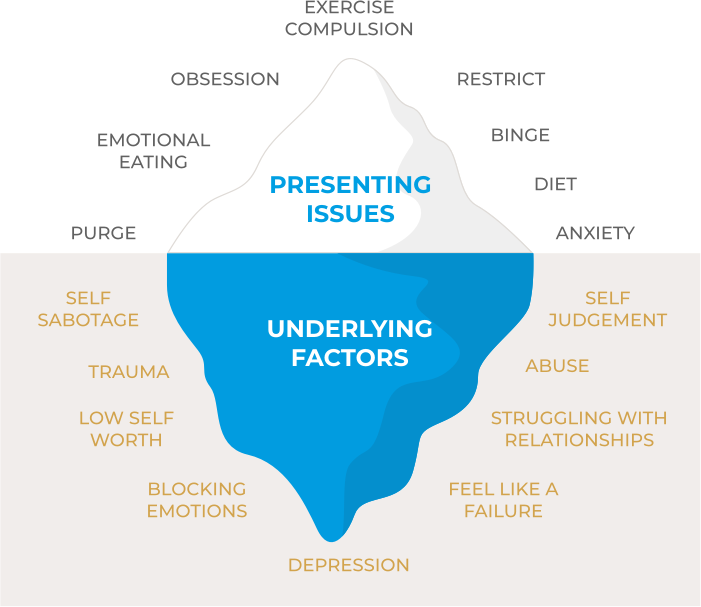Counselling & Psychotherapy
- Personalised Care: Targeted Therapy Designed to Meet Your Unique Health Goals
- Expert Guidance: Professional Team Of Psychotherapists. Counsellors & Psychologists
- Governance & Supervision: Trained & Supervised Team To Ensure Quality Of Care
CELEBRATING 20 YEARS IN PROVIDING EXCELLENT HEALTHCARE
Mental Health Reset
When your mind is overwhelmed, everything feels harder – sleep, food, work, relationships. The Mental Health Reset brings together focused therapy with targeted nutritional insight, supported by a screening blood test, to help you understand what’s driving your mood, energy and resilience.
You’ll start to:
- Untangle anxiety, low mood or stress with a specialist therapist
- Explore how food, sleep and lifestyle are affecting your mental health
- Use blood test findings to guide simple, effective changes
- Build a grounded plan for feeling more like yourself again
Package investment: £800
What’s Included: 4 therapy sessions • blood test • 2 nutrition sessions
COUNSELLING & PSYCHOTHERAPY
Transform Your Relationship With Weight, Food & Your Body
At WeightMatters, we are dedicated to supporting individuals in their journey towards health and wellness through tailored counselling and psychotherapy services.
Our clinic specialises in addressing weight-related challenges, disordered eating, negative body image, and eating disorders. Understanding the complex interplay between physical health and mental wellbeing, we also provide comprehensive support for clients dealing with anxiety, depression, and various other mental health concerns.

Counselling & Disordered Eating
Personalised counselling aimed at understanding and addressing disordered eating patterns, helping you develop healthier relationships with food.

Body Image & Self-Esteem
Specialised therapeutic interventions to help improve body image and build self-esteem, so you can feel more confident in your body.

Integrated Mental Health Services
Comprehensive mental health support addressing weight-related issues and other psychological conditions intertwined with eating and body image.

Balancing Weight & Emotions
Personalised strategies to find peace between your weight, emotions, and mental wellbeing, promoting a healthier, more fulfilling life.
Whether you are facing specific concerns about eating and weight or broader mental health challenges, we are here to support you every step of the way. Discover a balanced path forward with our dedicated support.
Begin your journey towards a healthier, more balanced life with the guidance and support of our team. Contact us today to understand how you can get started.
TAKE CONTROL OF YOUR HEALTH TODAY – WE ARE HERE TO HELP
Struggling with weight and eating challenges? You don’t have to face it alone.
Our compassionate team is ready to listen, support, and guide you toward a healthier, happier life.
Book your free call now and take the first step.
OUR FEES
Our initial consultation is free of charge, with health coaching sessions starting from £90, therapy sessions at £120, and nutrition consultations from £200.
Health packages and multi-session bundles available – we’ll guide you to the most suitable option when we speak.
MEET JAMES, CEO & FOUNDER OF WEIGHTMATTERS
James describes how the therapy team at WeightMatters is trained to deal with complex weight presentations.
Psychological Strategies
Psychological help for managing obesity and eating disorders involves a combination of therapeutic approaches, behavioral strategies, and emotional support to address both the physical and mental aspects of weight management, and someone’s relationship with food and their body.
Here are some of the different approaches we utilise at WeightMatters to support our clients with psychological therapy.
1. Understanding the Psychological Factors
- Emotional Eating: Recognizing how emotions (stress, sadness, boredom) influence eating behaviours.
- Body Image Issues: Addressing self-esteem and body dissatisfaction.
- Behavioral Patterns: Identifying triggers for overeating and developing healthier habits.
2. Effective Psychological Strategies
Cognitive Behavioral Therapy (CBT)
- Focuses on identifying and changing negative thought patterns related to food and body image.
- Helps set realistic goals and develop coping mechanisms for challenges.
Motivational Interviewing (MI)
- Helps individuals explore and resolve ambivalence about lifestyle changes.
- Encourages self-motivation and builds confidence.
Mindfulness-Based Approaches
- Includes mindfulness meditation and mindful eating techniques.
- Enhances awareness of hunger and fullness cues.
- Reduces impulsive and emotional eating.
Dialectical Behavior Therapy (DBT)
- Useful for managing emotional dysregulation that contributes to overeating.
- Teaches skills like distress tolerance and emotional regulation.
Acceptance and Commitment Therapy (ACT)
- Encourages acceptance of challenging emotions and commitment to positive behavioral changes.
- Promotes a values-driven life rather than focusing solely on weight.
3. Behavioral Interventions
- Habit Tracking: Monitoring food intake, physical activity, and emotions to identify patterns.
- Behavioral Contracts: Setting clear, achievable goals with rewards for milestones.
- Stimulus Control: Reducing environmental triggers that lead to overeating.
- Relapse Prevention: Building tools to recover when eating goes off-plan
- Structured Meal Plans: Developing routines to prevent impulsive eating.

GETTING STARTED
We aim to create a safe and supportive environment, where your therapist will listen with compassion to understand your experience, and explain how treatment can support you.
Getting Started
We value creating a personal therapy that is tailored to your specific needs and requirements.
When behaviours around food, eating and exercise feel out of control, and your head is spinning with anxiety about your weight and body image, knowing where or how to start therapy can feel confusing and hopeless.
It can take a lot of courage to make contact, and we want to support you through the first step of getting in touch.
Making an Enquiry
Your journey with us begins by taking a moment to reach out. You can call us directly, book a call, submit a website form, or send us an email.
One of our Client Services Team will arrange a 20-minute call with you. This is your Time To Ask us any questions you have about treatment and support.
During this call, we’ll take the time to listen carefully to your story, and begin to understand what has brought you to therapy. We’ll explore what you’re hoping to gain, the times that work best for you, and any preferences you may have for the type of therapist you’d like to work with.
Together, we’ll consider which therapist is the best fit for your needs and talk through the next steps, including how our 50-minute Initial Assessment Session can provide space to begin exploring what’s going on for you, and get a better understanding of your bespoke treatment plan.
Initial Assessment Session
It is important that we listen carefully to your experience, and understand how you want to improve your health and wellbeing.
Your therapist will ask what you specifically would like to get from your first meeting together, and ensure that your questions are answered.
Exploring together some of the themes and patterns that you bring to the session, and with a clear understanding of your health goals, your therapist will share an initial plan of how they can support your healing transformation.
There are some Good Things to Know
Once booked in you will receive some documents to complete before your initial session, which gives your therapist some context about your eating history and behaviour.
Sessions last for 50 minutes, but some therapists can offer longer sessions on request. Initially we like to work with you on a weekly basis, but for some people twice weekly might be a better option.
The length of therapy depends on your individual needs and requirements, and your therapist will work with you to find the right time to end.
In your Early Sessions
Your therapist will take time to understand you and the problems you are bringing to therapy, exploring how you perceive different elements of your life.
Understanding the issues you are struggling with around weight, food, eating and body image allows your therapist to plan how best to support you.
Together you will agree areas to focus on that will move you towards the change you are looking for from therapy.
Reducing Symptoms
We ask you to keep a food diary for a few weeks, so we can highlight patterns of behaviour that cause you distress, and explore the symptoms you are experiencing.
We look at the big picture of how your nutrition is affecting your physical and mental health and suggest small changes to eating and lifestyle so you can feel better.
Reducing symptoms of anxiety, stress and cravings allows us to explore the underlying psychological factors behind your experiences.
The Root Causes of Your Eating Distress
This is where we explore the reasons why you struggle with your eating behaviour. Understanding your ‘food script’ helps us identify why, when and how your distorted patterns of eating took hold, and gives us a clear focus for psychological interventions that will support you in moving forwards.
This begins the Process of Real Change
We can be hungry for other things in life, that food can replace, and our eating can often provide us with momentary comfort.
We work with you to bring unhelpful patterns of thinking, feeling and behaviour that are connected with food into awareness.
Your therapist will support you in teasing apart these unhelpful connections, providing you with skills to create change in your life.
We invite You to Bring All of You to Therapy
Our clients come to us with some form of distress around food, eating, weight and size. As they progress through therapy many realise that their eating behaviour and size often represent layers of distress, coping and unresolved issues from other aspects of their lives.
The permission is that you can bring all of yourself to therapy. Our therapists are trained to deal with areas such as trauma, abuse, addiction and bereavement.
We invite you to share with us any topic or theme in your life that is making you unhappy.
Finally let’s talk about Length of Therapy & Ending
The length of therapy is dependent on many factors that are personal to you. We offer short-term therapy, which can target symptom reduction and may be suitable if you have budget constraints.
We also offer longer term therapy if you want to work at a deeper level and need more ongoing support in your process of growth and change.
Good therapy takes time, and we ask all of our clients to commit to an initial 10-hours of therapy time, which most people consume as 12 x 50-minute sessions.
Ending therapy is something you can discuss with your therapist at any time.
They will explore your motives and feelings about this, and together you can agree on a suitable end date that will facilitate a positive and nurturing end to your relationship.
Get help today
Start your healing journey
Contact us
Take the first step, reach out and talk to us.
You can refer yourself for treatment, or get a referral from a healthcare professional.
Call us on 020 7622 7727, email us a question or book a call.
Time to start
Share your experience
Our friendly and experienced team will listen carefully to your reason for contacting us.
They will ask some questions and match you to the service and practitioner that best fits your needs.
Time to ask
Your assessment
Your journey starts with your initial assessment session.
Your practitioner will explore your current situation, ask about your change goals, and create your bespoke treatment plan.
Time to understand
Treatment, healing & recovery
When you have agreed your treatment plan, you will meet with your practitioner / team to support your recovery.
We will support you every step of the way as you create a healthier relationship with weight, food and your body.
Time to heal
INVESTING IN YOUR HEALING JOURNEY
We believe good therapy takes time – and that your time should be valued.
Your journey begins with an Initial Assessment Session – £120
Click below to see our full fee structure, and explore our flexible therapy options.
MEET TASCH, CLINICAL DIRECTOR OF TALKING THERAPIES
Dr Natascha Van Zyl describes our approach to psychological therapies at WeightMatters.
TREATMENT AREAS
Here Are The Treatment Areas We Recommend For Our Counselling & Psychotherapy Services
Explore how we can support you in changing your relationship with weight, food, eating and your body.
NEURODIVERSITY POSITIVE PRACTICE
We have created a healthcare space where every brain is understood, respected and supported.
IF IT FEELS MORE COMFORTABLE, EMAIL US
Do you have a question about our treatment and support?
Leave your details below, and we will come back to you with a personalised response.
